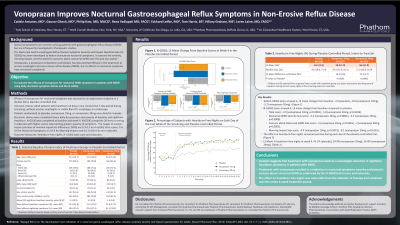Monday Poster Session
Category: Esophagus
P2220 - Vonoprazan Improves Nocturnal Gastroesophageal Reflux Symptoms in Non-Erosive Reflux Disease
Monday, October 28, 2024
10:30 AM - 4:00 PM ET
Location: Exhibit Hall E

Has Audio

Catiele Antunes, MD
Yale School of Medicine
New Haven, CT
Presenting Author(s)
Award: Presidential Poster Award
Catiele Antunes, MD1, Gaurav Ghosh, MD2, Philip Katz, MD3, Rena Yadlapati, MD, MSHS4, Eckhard Leifke, MD5, Thomas Harris, BSc, PharmD5, Hillary Graham, MS5, Loren Laine, MD1
1Yale School of Medicine, New Haven, CT; 2New York-Presbyterian Hospita/Weill Cornell, New York, NY; 3Weill Cornell Medicine, New York, NY; 4University of California San Diego, San Diego, CA; 5Phathom Pharmaceuticals, Buffalo Grove, IL
Introduction: Nocturnal symptoms are common among patients with gastroesophageal reflux disease (GERD), but infrequently evaluated in therapeutic studies. The Nocturnal Gastro-esophageal reflux disease Symptom Severity and Impact Questionnaire (N-GSSIQ) is a validated instrument for nocturnal GERD symptoms, assessing severity, morning impact, and concern about nocturnal GERD over the prior 2 weeks. We used the N-GSSIQ to evaluate the efficacy of vonoprazan for nocturnal symptoms as an exploratory endpoint in a double-blind, placebo-controlled trial of patients diagnosed with non-erosive reflux disease (NERD).
Methods: Adult patients with heartburn ≥4 days in any consecutive 7-day period during screening, without esophagitis on endoscopy, were randomized to placebo, vonoprazan 10mg, or vonoprazan 20mg once daily for 4 weeks. Electronic diaries were completed twice daily for presence and severity of daytime and nighttime heartburn. N-GSSIQ was completed at baseline and week 4. Minimal important differences for N-GSSIQ total score and subscales are ≤0.6.
Results: Among 772 subjects, the mean percentage of heartburn-free nights during the screening period was 29.6, 25.8, and 31.1, for patients randomized to placebo, vonoprazan 10mg and 20mg, respectively. After 4 weeks, the least-square (LS) mean percentage of heartburn-free nights was 43.3 for placebo, 59.9 for vonoprazan 10mg (LS mean difference=16.5%, p< 0.0001 vs. placebo), and 56.4 for vonoprazan 20mg (LS mean difference=13.1%, p< 0.0001 vs. placebo) (Table 1). N-GSSIQ scores showed improvement with vonoprazan compared to placebo in total score (LS mean difference vs. placebo of -2.9 and -1.8 for vonoprazan 10mg and 20mg, respectively; p< 0.005 for both comparisons), nocturnal symptom severity (LS mean difference vs. placebo of -5.4 and -3.5 for vonoprazan 10mg and 20mg; p< 0.001 for both comparisons), and concern about nocturnal GERD (LS mean difference vs. placebo of -2.0 for both vonoprazan 10mg and 20mg; p< 0.0001), but not in morning impact (Table 1).
Discussion: The results of our study suggest that vonoprazan treatment leads to effective and meaningful relief of nighttime heartburn symptoms in patients with NERD.
Note: The table for this abstract can be viewed in the ePoster Gallery section of the ACG 2024 ePoster Site or in The American Journal of Gastroenterology's abstract supplement issue, both of which will be available starting October 27, 2024.
Disclosures:
Catiele Antunes, MD1, Gaurav Ghosh, MD2, Philip Katz, MD3, Rena Yadlapati, MD, MSHS4, Eckhard Leifke, MD5, Thomas Harris, BSc, PharmD5, Hillary Graham, MS5, Loren Laine, MD1. P2220 - Vonoprazan Improves Nocturnal Gastroesophageal Reflux Symptoms in Non-Erosive Reflux Disease, ACG 2024 Annual Scientific Meeting Abstracts. Philadelphia, PA: American College of Gastroenterology.
Catiele Antunes, MD1, Gaurav Ghosh, MD2, Philip Katz, MD3, Rena Yadlapati, MD, MSHS4, Eckhard Leifke, MD5, Thomas Harris, BSc, PharmD5, Hillary Graham, MS5, Loren Laine, MD1
1Yale School of Medicine, New Haven, CT; 2New York-Presbyterian Hospita/Weill Cornell, New York, NY; 3Weill Cornell Medicine, New York, NY; 4University of California San Diego, San Diego, CA; 5Phathom Pharmaceuticals, Buffalo Grove, IL
Introduction: Nocturnal symptoms are common among patients with gastroesophageal reflux disease (GERD), but infrequently evaluated in therapeutic studies. The Nocturnal Gastro-esophageal reflux disease Symptom Severity and Impact Questionnaire (N-GSSIQ) is a validated instrument for nocturnal GERD symptoms, assessing severity, morning impact, and concern about nocturnal GERD over the prior 2 weeks. We used the N-GSSIQ to evaluate the efficacy of vonoprazan for nocturnal symptoms as an exploratory endpoint in a double-blind, placebo-controlled trial of patients diagnosed with non-erosive reflux disease (NERD).
Methods: Adult patients with heartburn ≥4 days in any consecutive 7-day period during screening, without esophagitis on endoscopy, were randomized to placebo, vonoprazan 10mg, or vonoprazan 20mg once daily for 4 weeks. Electronic diaries were completed twice daily for presence and severity of daytime and nighttime heartburn. N-GSSIQ was completed at baseline and week 4. Minimal important differences for N-GSSIQ total score and subscales are ≤0.6.
Results: Among 772 subjects, the mean percentage of heartburn-free nights during the screening period was 29.6, 25.8, and 31.1, for patients randomized to placebo, vonoprazan 10mg and 20mg, respectively. After 4 weeks, the least-square (LS) mean percentage of heartburn-free nights was 43.3 for placebo, 59.9 for vonoprazan 10mg (LS mean difference=16.5%, p< 0.0001 vs. placebo), and 56.4 for vonoprazan 20mg (LS mean difference=13.1%, p< 0.0001 vs. placebo) (Table 1). N-GSSIQ scores showed improvement with vonoprazan compared to placebo in total score (LS mean difference vs. placebo of -2.9 and -1.8 for vonoprazan 10mg and 20mg, respectively; p< 0.005 for both comparisons), nocturnal symptom severity (LS mean difference vs. placebo of -5.4 and -3.5 for vonoprazan 10mg and 20mg; p< 0.001 for both comparisons), and concern about nocturnal GERD (LS mean difference vs. placebo of -2.0 for both vonoprazan 10mg and 20mg; p< 0.0001), but not in morning impact (Table 1).
Discussion: The results of our study suggest that vonoprazan treatment leads to effective and meaningful relief of nighttime heartburn symptoms in patients with NERD.
Note: The table for this abstract can be viewed in the ePoster Gallery section of the ACG 2024 ePoster Site or in The American Journal of Gastroenterology's abstract supplement issue, both of which will be available starting October 27, 2024.
Disclosures:
Catiele Antunes: Phathom Pharmaceuticals – Stock-publicly held company(excluding mutual/index funds).
Gaurav Ghosh: Phathom Pharmaceuticals – Consultant.
Philip Katz: Phathom Pharmaceuticals – Consultant. Sebella – Consultant.
Rena Yadlapati: Braintree Pharmaceuticals – Consultant. Ironwood Pharmaceuticals – Grant/Research Support. Medtronic – Consultant. Phathom Pharmaceuticals – Consultant. Reckitt Beckiser Healthcare Ltd – Consultant. RJS Mediagnostix – Advisory Committee/Board Member. StatLinkMD – Consultant.
Eckhard Leifke: Phathom Pharmaceuticals – Employee, Stock Options, Stock-publicly held company(excluding mutual/index funds).
Thomas Harris: Phathom Pharmaceuticals – Employee, Owner/Ownership Interest, Stock Options, Stock-publicly held company(excluding mutual/index funds).
Hillary Graham: Phathom Pharmaceuticals – Employee, Stock Options, Stock-publicly held company(excluding mutual/index funds).
Loren Laine: Phathom Pharmaceuticals – Consultant.
Catiele Antunes, MD1, Gaurav Ghosh, MD2, Philip Katz, MD3, Rena Yadlapati, MD, MSHS4, Eckhard Leifke, MD5, Thomas Harris, BSc, PharmD5, Hillary Graham, MS5, Loren Laine, MD1. P2220 - Vonoprazan Improves Nocturnal Gastroesophageal Reflux Symptoms in Non-Erosive Reflux Disease, ACG 2024 Annual Scientific Meeting Abstracts. Philadelphia, PA: American College of Gastroenterology.

